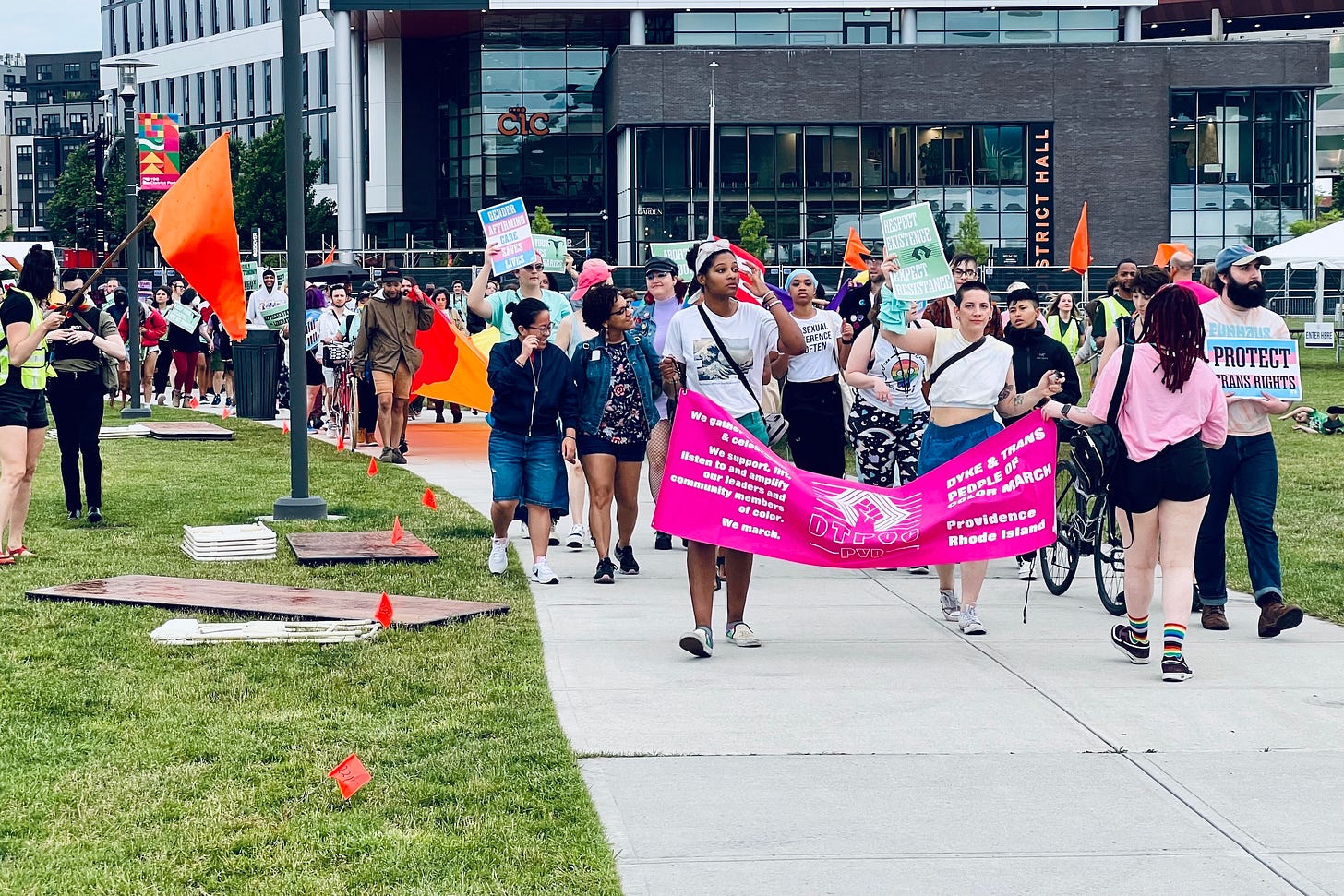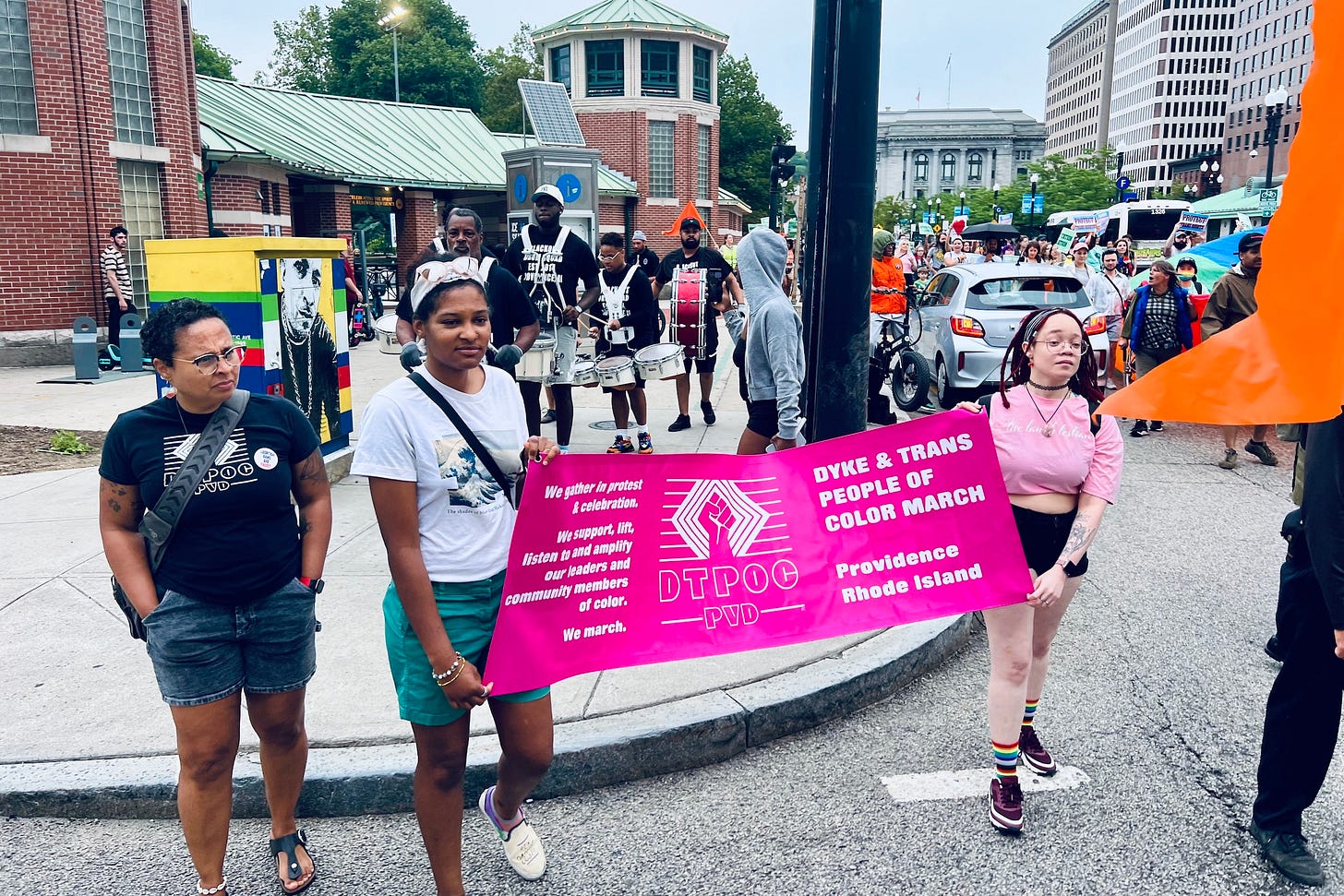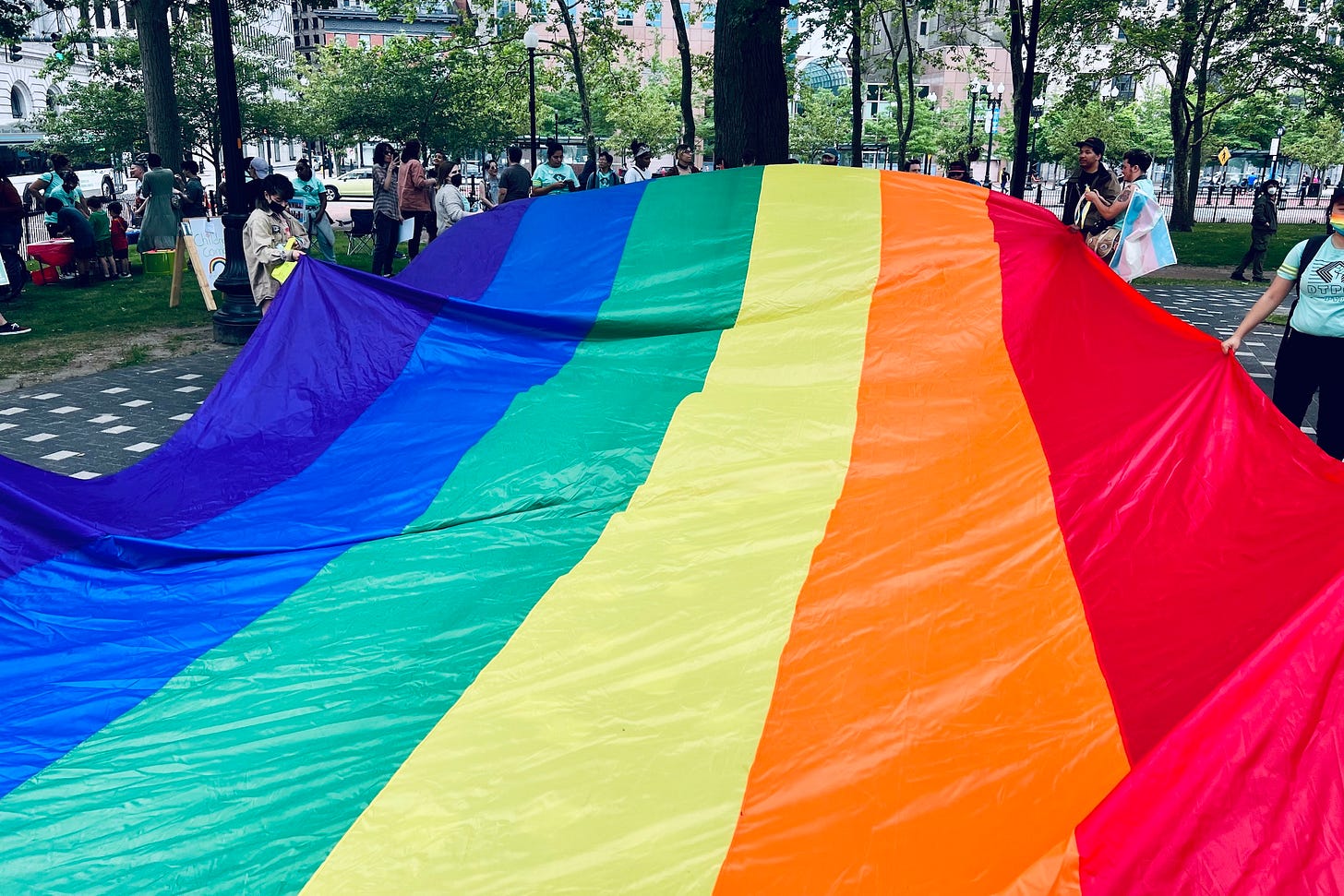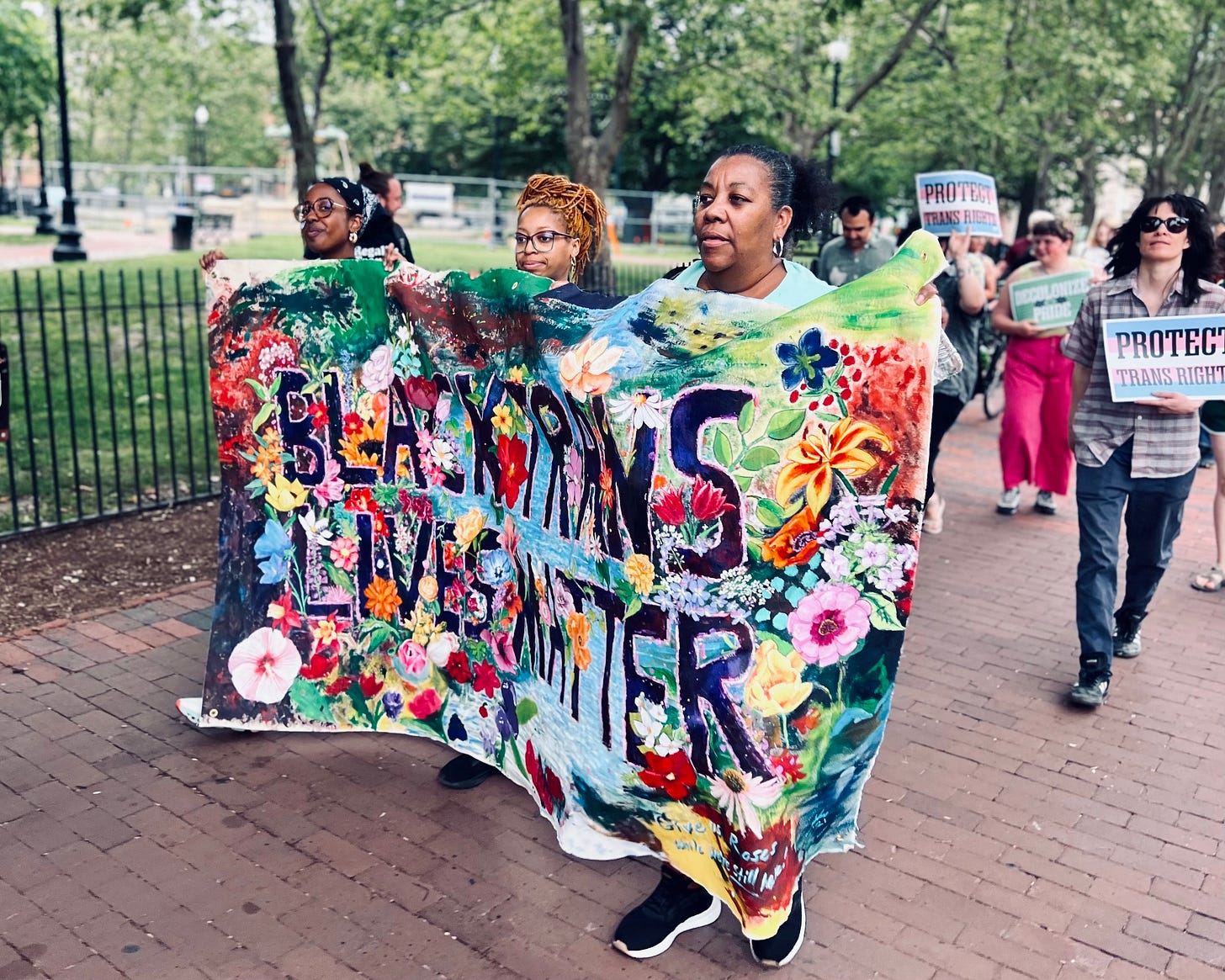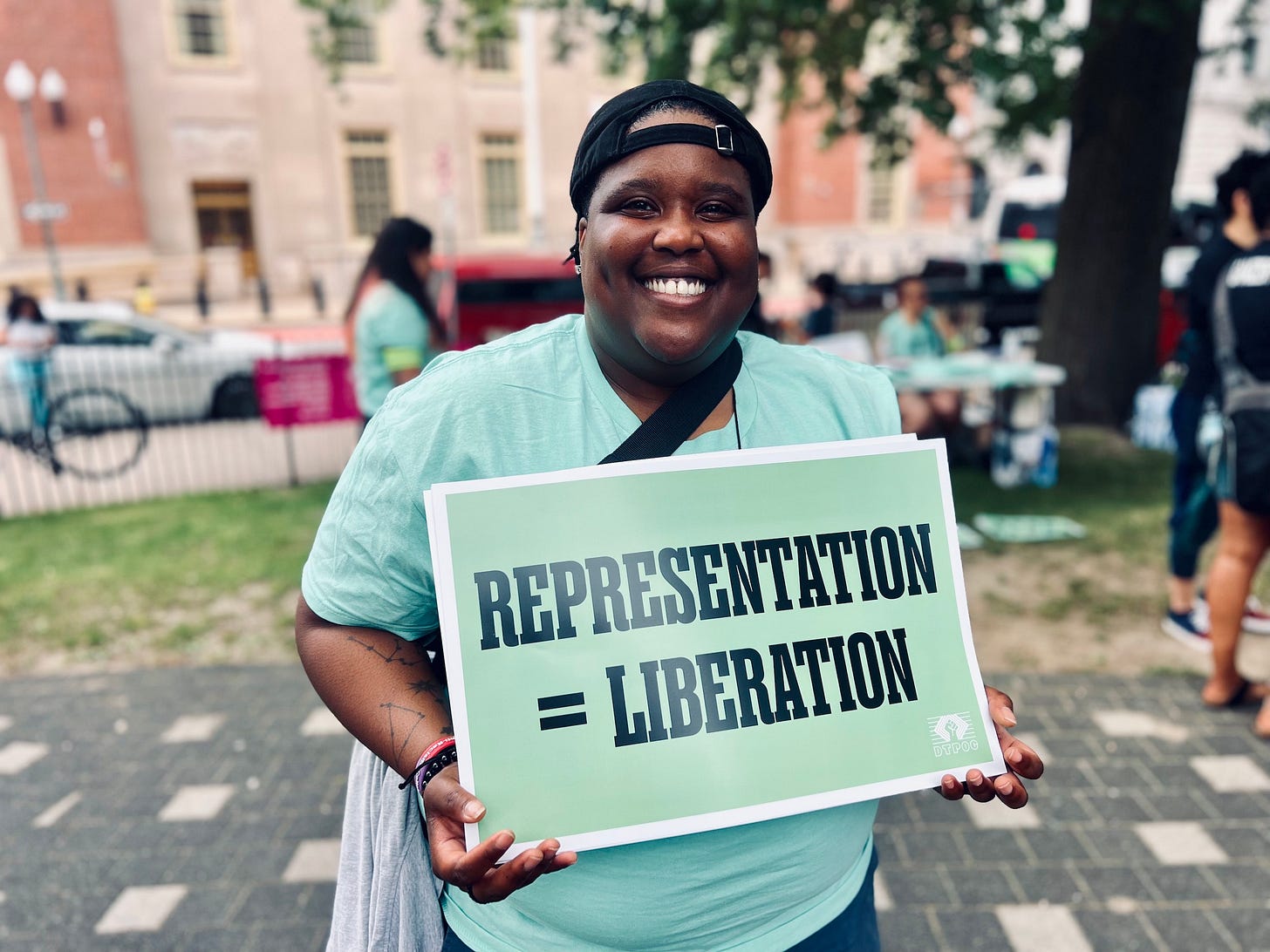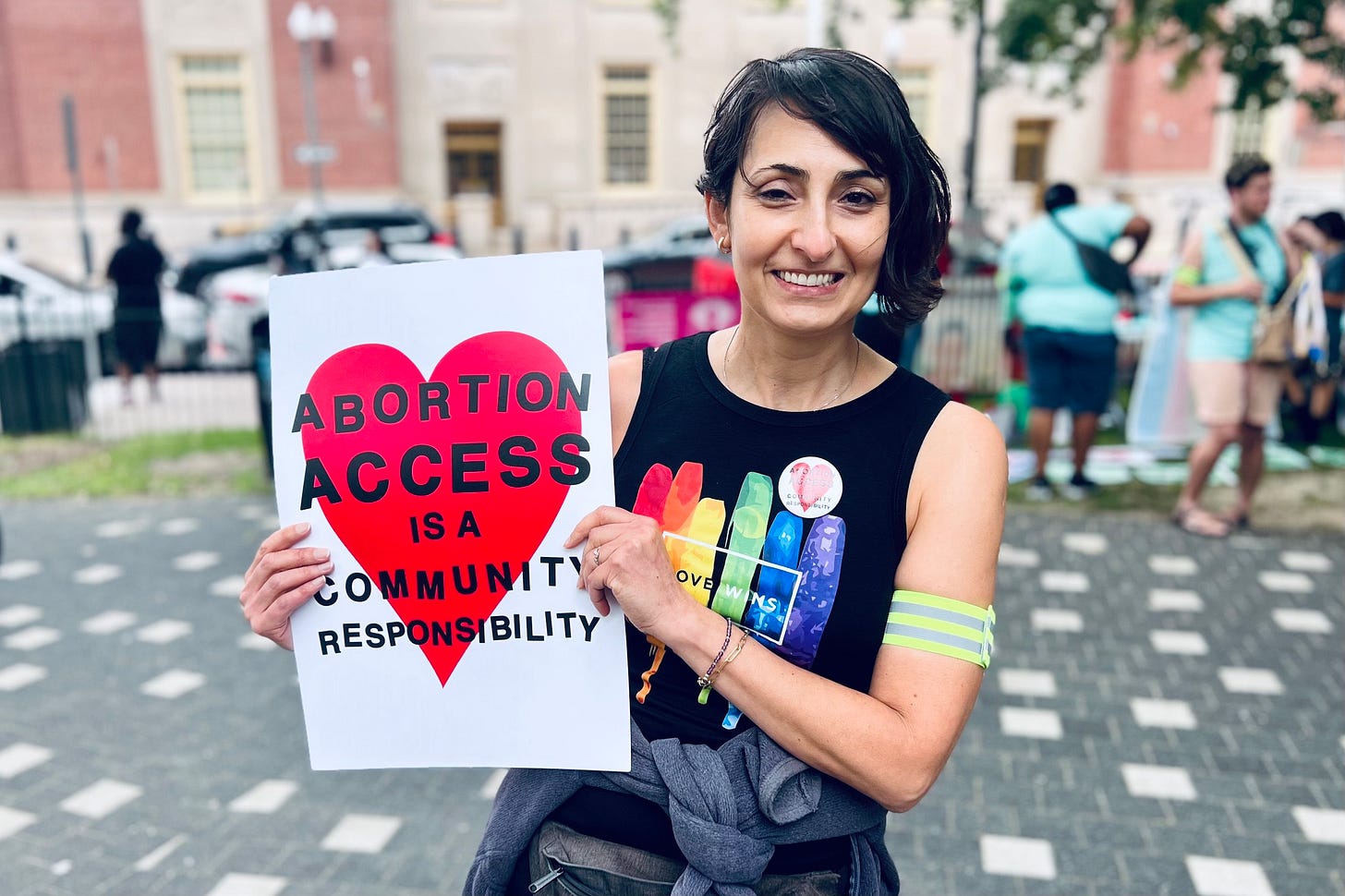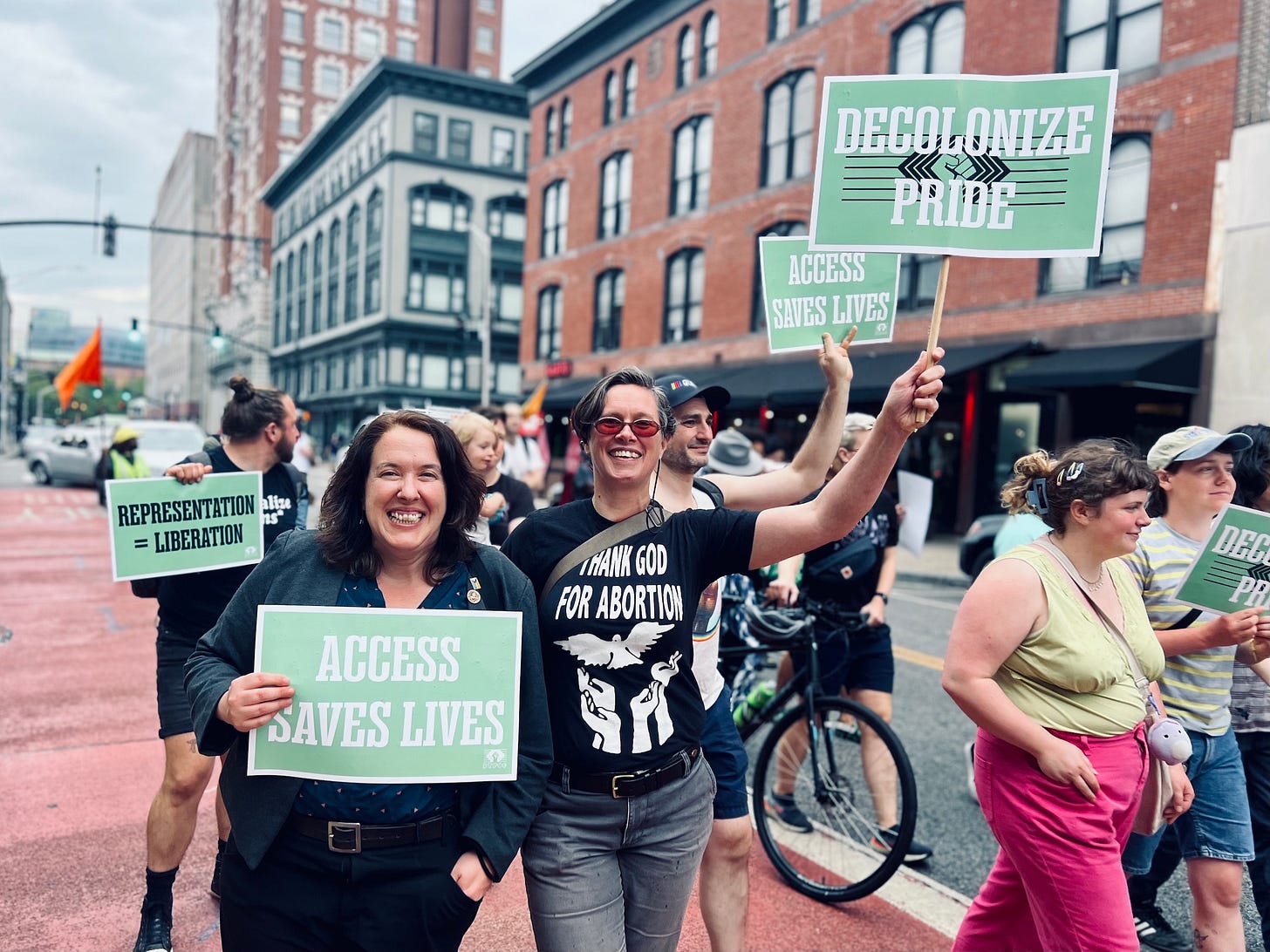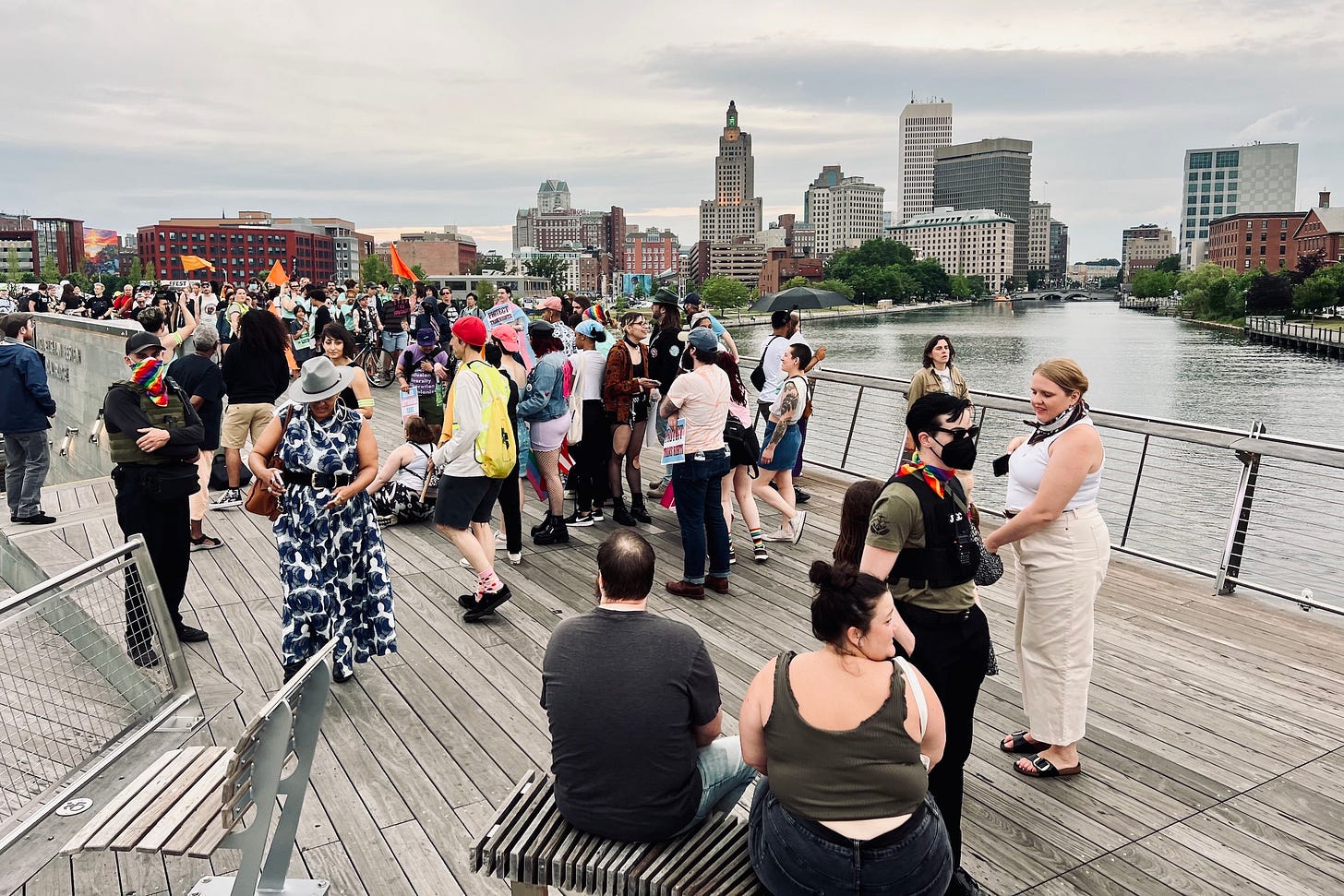The fifth [not quite annual] Dyke and Trans People of Color march centers bodily autonomy
“Traditional Pride celebrations in Rhode Island, and across the country, mirror the larger capitalistic society and mostly focus on white cisgendered males and are backed by corporate sponsorships...
“To give you a little bit of history, we came together in 2019 and decided to organize the first march in Rhode Island, centered around Dyke and Trans People of Color, a celebratory space for our community,” said organizer Michelle Veras. “Traditional Pride celebrations in Rhode Island, and across the country, mirror the larger capitalistic society and mostly focused on white cisgendered males and are backed by corporate sponsorships. Over the years in Rhode Island, there have been performative attempts at inclusion, but nothing of substance has ever been put into place - aside from this march...”
This was the fifth, almost annual, Dyke and Trans People of Color March in Providence. I covered the first three marches here, here and here, missing the fourth one. Full video of the march and the speeches that preceded it available in this video here:
“In the years since we started, we've shifted the theme of the march to focus on the issues that are particularly relevant for the communities which we come from,” continued Veras. “This year our theme is bodily autonomy, centering BIPOC queer communities access to gender affirming and reproductive care.
“As I said, my name is Michelle. I am queer, I'm Latina, I'm a mom and I've worked in public health for my whole career. I was born and raised in Providence and am proud to call this place home today. I'm so thankful to be here with all of you today. We're here today in community, in celebration and in protest. I'm grateful to stand alongside these two amazing organizers. Well behind me, Ancha and Ayako, who I'm also proud to call friends.
“Our communities have been impacted by the desire to control our bodies on so many levels, and this desire is rooted in white supremacy, capitalism, and patriarchy. It hits us all differently. For some of us, it means that our right to decide when and how we parent is taken away. For some, it means being denied access to life saving gender affirming care for our children. It has meant being told what books they can read, what sports team they can play on, and how they should wear their hair. For centuries, this country has tried to control Black and brown bodies, queer and trans bodies, but we stand here today and every damn day to let them know we will not be controlled. We know that the power does not lie with these systems. The power lies with us. We will keep showing up for each other because these systems will not save us. We will save us. Everyone here will save each other.”
Organizer Ayako Takase is a gender queer woman, Japanese mom, partner, designer, and also a teacher.
“Today we gather in solidarity, recognizing that we live in a world where we often feel like we have so little control from the grip of capitalism, the despair of our economy and alarming reality of our planet burning down,” said Takase. “It's like we're constantly being told who we are and how we should live. Our bodies, beliefs, history, culture, art and self-expression are losing their autonomy and control on a daily basis somewhere in the country, and that's just not right. Here in Providence, we might not see the immediate threats some of our folks in other places face just yet, but we feel it and some of us are in fact experiencing increased hatred and discrimination. It's because there are people out there who think they can assert control by trying to control us. It's fucked up and we won't stand for it.
“In times like this, it's easy to get caught up in our own struggles and personal battles and go about our lives separately. But in moments like this, it's more important than ever that we show up and support each other. We need to lift up those most marginalized that are targeted, especially our Black and brown women, our trans and non-binary folks. We need to fight for their right to autonomy, to live free from the injustice and oppression that seeps into every aspect of their lives.
“Now, each of us might have come here today for our own reasons. Maybe it's personal, cause close to our hearts. Maybe it's a deep desire to be part of our community or maybe we're just fed up with the whole messed up system and want to do something meaningful, or show up as an ally. Whatever brings you here, remember that making progress requires all of us to keep showing up and never give up the fight for our autonomy. The fight might look different for each of us, and that is okay. Knowing our role roles and giving it all our, wherever we can make a difference, is crucial.
“Pride happens once a year and we've chosen this time during Pride together and march together. As organizers, we can only dedicate our time and energy to putting an event like this on once a year, but let's be real: Our community faces struggles and challenges all the time, not just once a year. That's why I'm asking each and every one of you, especially our allies, to never stop showing up, even after Pride month is over. Stay committed, keep supporting and actively engaged with local organizations fighting daily for social justice for marginalized communities. I thank all of you for being here today. It's an honor to host this March year after year alongside like-minded folks who share our passion, values and beliefs. There's incredible power when we all come together, when we unite our voices and our energy. Even if for now, it's just about finding the sense of belonging in a world that feels like it's spiraling out of control, remember that progress can only happen when we harness the strengths of our collective power. Stay safe and take care.”
Organizer Ancha Santana is a psychotherapist and mom.
“As I was procrastinating, instead of figuring out what to say, I saw a Rhode Island ACLU post on Instagram recapping their involvement with Rhode Island's first Pride, which was held in 1976,” said Santana. “The argument for having the celebration was that other marginalized groups in Rhode Island were given the opportunity to celebrate their contributions to the state and therefore so should people of the 'gay concern,' which is how we were referred to back then. In the background, I could hear the chant, 'Gay, straight, white, Black. Same struggle, same fight.'
“Is it though? No.
“Here we are, 47 years later and the initial concern of not being erased from Rhode Island history has translated into the exclusion of all others who do not fit the mold: white, cisgender male and corporate.
“As I stated two years ago, I'm tired, as a Black woman, of existing in this country where aggressions and microaggressions are hurled at me at the same speed that I'm able to get up, (and not recover) from the last one. So I would like to shout out to some of the folks who recently took part in the continuous beating of this Black body and Black mind.
“Shout out to the cis white woman mining from the wealth of indigenous knowledge as 'interesting and new ideas' to be exploited for the capitalistic gains. Shout out to the cis white man who told me, while he sat across from me, that only 14% of Blacks have any sort of intelligence and don't belong in society. Shout out to the performative white queer community members whose actions really show your fear of change in the status quo, which benefits you and dictates your actions.
“I'm a Black, immigrant, queer woman. Notice Black comes first. Denial of bodily autonomy is the ongoing enslavement of Black women who by default have less access to sexual health, reproductive care, contraception and abortions. When 60% of abortion seekers are Black and 50% live below the poverty line, what better way to keep us from self-actualizing than to force the unwanted labor of childbearing and rearing upon our already exhausted, resource scarce lives?
Already at an economic disadvantage due to centuries of systemic racism, the lower level needs such as food, shelter, and safety have been denied to us, ensuring that we never leave the hood. But we don't need to worry. Gentrifiers have arrived and they'll make sure that we do. The war on Black bodies continues. 56 Black people have lost their lives to police violence so far this year.”
Santana then read the names of the trans lives lost to violence this year.
"Say it with me,” said Santana leading the crowd in a chant, “Black Lives Matter!"
The first speaker was Senator Tiara Mack (Democrat, District 6, Providence), introduced as “the first Black queer person to hold this seat in Rhode Island. Senator Mack has sponsored legislation to defend the interests of LGBTQ folks of color in the state, including equitable housing, food, and income.”
“We cannot untangle Black liberation from trans liberation. At the heart of reproductive justice and body autonomy is queer justice, trans justice and criminal justice,” said Senator Mack. “We are more than just corporate parades. We must be a wall of solidarity and a movement of allies across movements because when queer and trans lives win, we all win. When Black lives win, we all win. And when reproductive health wins happen in our state, ensuring that Medicaid recipients finally have abortion coverage after 30 years, we all win. And when we win a comprehensive PReP and PAP coverage bill in our state, one of the most progressive in the nation, leading Rhode Island of a pathway to eradicate the transmission of HIV in the next five years, we all win.
“When we pass tenant centered legislation ensuring that we break the cycle of housing insecurity and homelessness, we all win. And when we build those wins, we create a world where everyone, no matter their bodies, no matter who they love, they have the freedom and the autonomy and the sense of justice and purpose in this world to realize a world that works for all of us. We cannot address the murdering of Black bodies, the violence against our Asian community, the horrible news and the horrible instances of trans violence without acknowledging that many of these injustices start because of systemic anti-Blackness, anti-transness, and anti-Asian hatred.
“We cannot just highlight these abhorrent actions without acknowledging that they occur within a system that is predicated on violence against our bodies, our Black and queer bodies. Systemic violence is the routine culprit of these national health headlines that tell our trans youth that they can't play or that our intersex youth that they must fit nicely into a box and get unnecessary surgeries as infants. It's the cost of their bodies and their autonomy. And we must interrogate these systems and reflect on how we are complicit in it and undo it within our own communities. It's contradictory for us to place that blame on a select few individuals and simultaneously uphold that same system.
“I have committed every single day in my legislation to center Black and queer lives because I cannot untangle my own queerness and my own Blackness from the work that needs to be done in our state.
“When we organize for our bodies, for our right to freely decide our own paths, we all win. We organize because we have others in our community creating supportive spaces. We organize because the world that we imagine is within our reach. We organize because we can't just imagine that world. We must help create it, shape it, and make what's possible for us possible for others.
“We deserve to live in a world that values the whole autonomous person. The days are long and the wins are few and far between, but the hope that these wins give us, especially the ones that happened last night in our State House, bring forth the tides of change and progress and resistance that has been historic in our Black and queer communities. And as we go forth and march today, I want to leave with the words of a Assata Shakur:
“It is our duty to fight for our freedom.It is our duty to win.We must love each other and support each other.We have nothing to lose but our chains.”
The next speaker was Daria Montaquila, a queer Black native of Providence and an organizer with Sista Fire.
“We are a growing network of women and non-binary people of color,” said Montaquila. “We are queer, we are immigrants, we are undocumented and we are creating a vision for our future. Part of that vision is holistic, reproductive and gender affirming care and healthcare. We are grateful to be here in partnership with the Dyke and Trans People of Color march and all of you. We deserve joy and justice as queer and trans folks. We are fierce and we are powerful.
“We are living in our authenticity and that is a threat to folks who do not share our values and our love or our joy. We know that there are people who do not believe in our right to be who we are, love who we love, or live healthy full lives. We gather today as a symbol of the power of our people to demand safe, sustainable communities where we are seen and valued for our whole selves, where being able to gather doesn't make us question if we will make it home safely, where we have unfettered access to healthcare, housing, good paying jobs and healing. Where care is not restricted by someone's opinion on whether or not we deserve it.
“I am honored to share this space with all of you today as we reaffirm our right to happiness, justice, and care. Today we march together in solidarity with one another and share in the joy of being our full selves. This march is for us, by us and we celebrate the queer people of color before us who have made today possible. We thank our queer and trans ancestors and carry them with us as we march toward a brighter future where our right to care, to love, to celebrate, to simply be, is not questioned. Thank you for being here. Thank you for your unapologetic demand for joy. Thank you for showing up as you today.”




